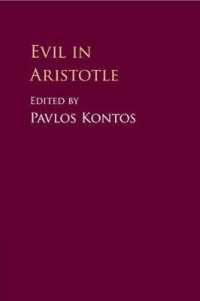Full Description
This volume contains the proceedings of the international conference The Road Europe Travelled Along. The Evolution of the EEC/EU Institutions and Policies, organized by the Associazione Universitaria di Studi Europei (AUSE) (European Community Studies Association - ECSA Italy) at the University of Siena in May 2008. The editors of this book hope it will contribute to the debate on an interpretative thesis which is widespread among scholars dealing with European integration. This thesis holds that the political and institutional circuit of the European Community/Union should be entirely dependent on the nation-states. The immediate implication of this view is that the moments of crisis in the EEC/EU, as well as its periods of relaunch, are due only to the will of and decisions made by the national states, more specifically their governments. On the contrary, many of the essays in this book show that community institutions have also played an important role in the developments in the EEC/EU.From this point of view the evolution of the Community, and subsequently of the European Union, can be examined also by analyzing the gradual extension of its area of intervention, and thus through a study of its common policies and actions. Moreover, an interdisciplinary reflection on the rules, procedures and practices behind the community decision-making process would also be very important. It would be extremely useful to examine the weakness or effectiveness of the decision-making mechanism, and to reconstruct the historical, political and legal reasons that have led to the evolution of this mechanism in order to have a better understanding of the historical-political path taken over the years by the European Community/Union.
Contents
ContentsMeessen: Ultra Vires. Making of Competition Law by the European Commission - Emmanuel Mourlon-Druol: The Victory of the Intergovernmental Method? The Emergence of the European Council in the Community's Institutional Set-up (1974-1977) - Arianna Pitino: The Influence of "Constitutional Symbolism". Passing from Rome to Lisbon - Barbara Curli: Transnational Elites and Monetary Regionalism. The Monetary Committee of the EEC in the 1960s - Sonke Ehret/Dominik Duell: Lighthouse Politics. The European Commission and its Agency Role in EU's Intergovernmental Foreign Policy-making within the Barcelona Process - Giacomo Benedetto: EU Constitutionalisation and the European Parliament - Luca Barani : L'architecture institutionnelle europeenne et la contribution de la Cour de Justice a sa structuration - Panos Kazakos: Economic Governance in the EU. Its Liberalism and Impact - Tomasz R. Szymczynski: On Some Consequences of the Contemporary Shape of the European Referendum - Maria Chiara Malaguti: The ECB, ESCB and the "Eurosystem". A New Paradigm between the Centre and the Peripheries - Krzysztof Nowaczek: Communitarisation of Legal Immigration Policy. Interactions between the European Commission and Member States in the Context of the "Newest Generation" Policy - Daniela Irrera: European Union and Civil Society. The Long, Tentative Engagement - Sandro Guerrieri: The Evolution of the European Parliament's Role before the Direct Elections (1952-1979) - Sara Kahn-Nisser: Inclusion, Diversity and the EP's Debates on Turkey's Accession - Fulvio Attina: Multilateralism, Europe, and Peace Operations - Fabio Raspadori: Deficit in Representation in the European Parliament. Shortcomings and Solutions - Daniele Pasquinucci : " Faire les Europeens ". Les origines de la politique d'information communautaire - Alessandro Isoni: Planism and "Third Way" Ideologies in the ECSC High Authority - Laura Grazi : Une cooperation transnationale difficile. Le Groupe socialiste au Parlement europeen et l'evolution politique et institutionnelle de la CEE (1958-1962) - Maria Romana Allegri: A Union of Democracies or a Democratic EU? - Simonetta Stabile: First Reflections on the European Telecom Market Authority - Filadelfio Basile/Domenico Spampinato: CAP Reforms: New Perspectives - Katarzyna Kosior: Between Implicit Renationalization and Growing Differentiation. The Common Agricultural Policy after the EU Eastern Enlargement and the Fischler Reforms - Lorenzo Mechi : Stabilisation sociale et efficience economique. Les origines " productivistes " du Fonds social europeen - Andrea Becherucci : De la satisfaction des besoins fondamentaux a l'amelioration des conditions de vie. Les progres de la politique sociale europeenne - Mauro Elli: Between Industrial and Energy Policy. The Issue of the European Capacity in Uranium Enrichment (1969-1974) - Filippo Pigliacelli: Supranational vs. Intergovernmental. The Role of Altiero Spinelli in the Definition of a Common Research Policy - Laura Scichilone: The European Commission and the Beginnings of the EEC's Environmental Policy (1969-1973) - Oscar Garavello: High-skilled Migrations South-North. Towards Integrated Immigration Policies of EU Member States - Gian Cesare Romagnoli: The Evolution of the EEC-EU Economic Policies towards the Mediterranean - Federica Di Sarcina : La CEE face aux defis des Nations unies pour la reconnaissance de la parite de genre (1975-1985) - Fabio Zucca : De la Communaute europeenne du Charbon et de l'Acier aux








